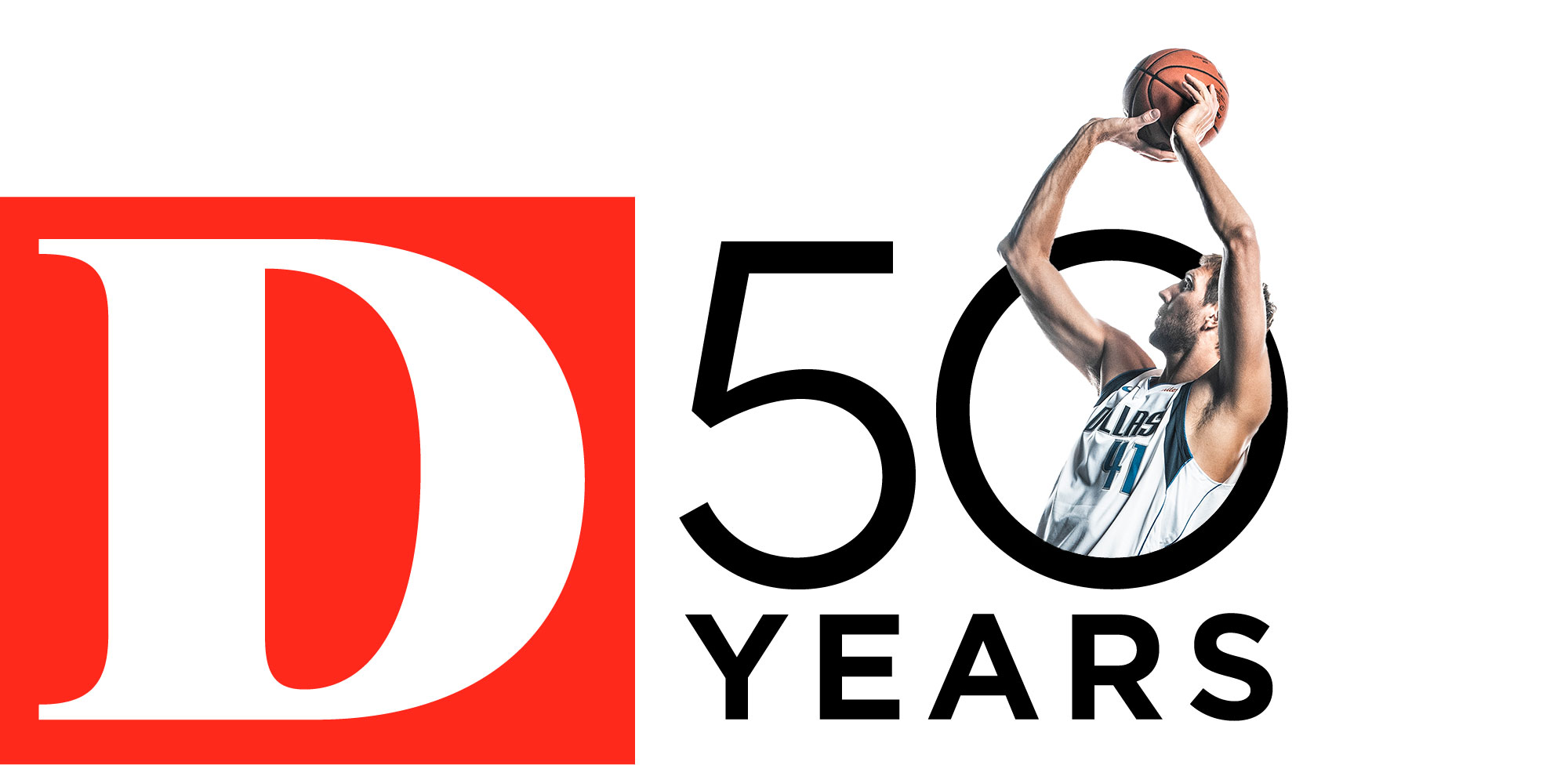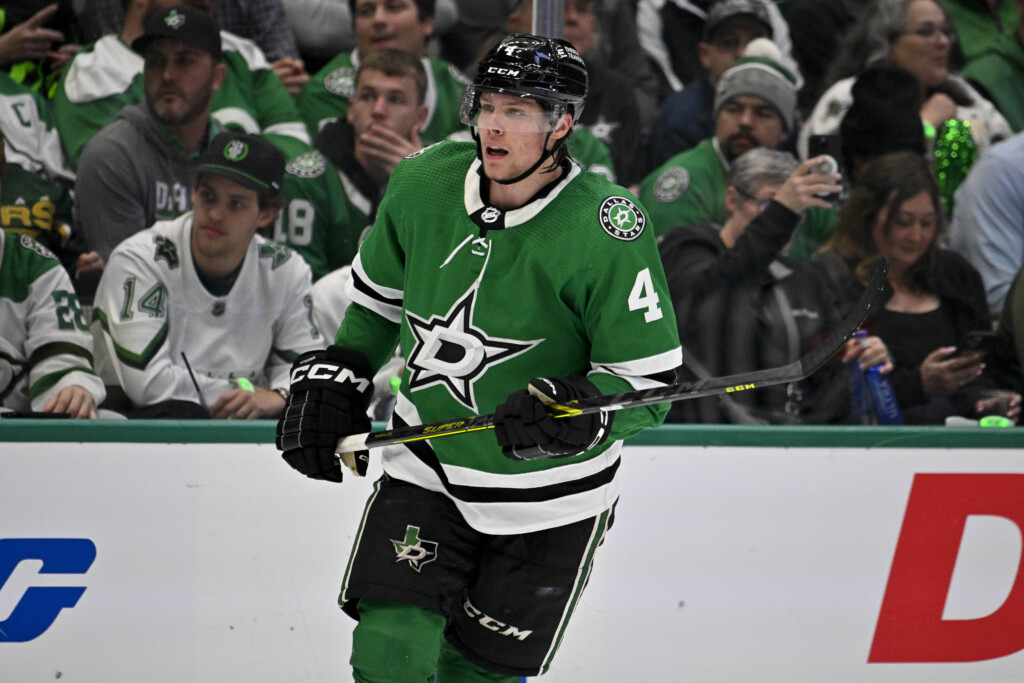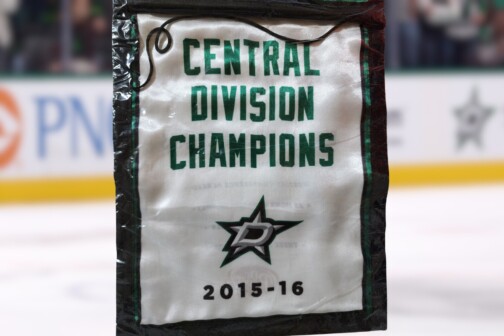Facing a 2-1 deficit going into Game 4 of their series with the Kraken, the Stars had to confront some uncomfortable facts.
In both of its playoff series, Dallas has spent a lot of time using its best weapons to cover its biggest deficiencies, and those weapons had not been getting the job done. That’s why Miro Heiskanen plays half the game (or more, as he did on Tuesday), covering for one of the oldest and slowest defensemen on the team. That’s why Jake Oettinger can’t afford to be average for even one night, lest the team collapse. That’s why the power play running roughshod over Minnesota was barely enough for the Stars to even the series at 2-2.
For all of its top-tier talent, Dallas has struggled to pull away in two straight series when confronted with a relentless forecheck by a less-talented team. For 10 games, its best players spent a whole lot of time plugging leaks rather than launching torpedoes. Remember, this series started with Joe Pavelski scoring four goals in an overtime loss. Those four goals kept the Stars in the game, but they weren’t enough to avoid the problems they created for themselves.
It’s funny how different a 2-2 series feels depending on how you get there. Given the heartbreaking overtime loss in Game 1 and the putrid showing in Game 3, Dallas very easily could have found itself in a 3-1 series hole had Oettinger let one or two shots get through in the first period of Game 4. Instead, the positive momentum was palpable. Heiskanen returned, Jamie Benn got that critical first goal, Oettinger rebounded, and the power play contributed two vital goals in a game that was a lot more nerve-wracking than the 6-3 scoreline would suggest.
This series is ridiculously tight, though it probably shouldn’t be. Seattle’s opportunistic shooting at even strength—remember those flurries in Games 1 and 3?—has meant the Stars must capitalize on their power-play chances to hold serve, and they finally did so in Game 4. Dallas’s penalty kill has only surrendered one goal in four games against Seattle, and it continued to hold the fort on Tuesday, turning back the Kraken’s two power-play chances, even without Ty Dellandrea and Jani Hakanpää.
Dallas needs the weapons that beat Minnesota in order to vanquish Seattle. The fact they have had so much trouble with the scoring-by-committee approach of the Kraken is testament to the vulnerability the Stars have had all year: they have a lot of eggs in just a couple of baskets. And hey, no shade to the great baskets out there, but sometimes a bunch of reliable paper bags is more effective, depending on the groceries.
This was even more apparent last year, when Jason Robertson’s lack of production was a key factor in Dallas’s wasting an all-time performance by Oettinger. This year the Stars have kept two straight playoff series in check because the rest of the team has stepped up when one of the top players has gone down. Sometimes it has been another top player; sometimes it has been a depth player like Evgenii Dadonov or even Thomas Harley; and other times it has been the same player, as with Oettinger following up one of his weaker performances with a strong one. Seattle’s scoring committee includes everyone out of necessity, but the Stars just need their superior firepower to show up when needed.
Losing Mason Marchment and Benn (for some of the game) could’ve caused the Stars to sag like they did in Game 3 after Heiskanen went down, but they didn’t. Dallas doubled down for the first two periods, and it was enough to withstand an enormous Seattle push (and a slightly worrisome Dallas turtle).
On Tuesday, Dallas repeatedly sabotaged the Seattle breakout, with Roope Hintz’s goal being the clearest example. The Stars have figured out that the best way to handle speed through the neutral zone and a hard forecheck is by forestalling the transition game where it starts—in the other zone. Their play with the puck in the offensive zone wasn’t just more productive; it was also more intelligent. Dallas forced the Kraken alternately to wait longer than they wanted before breaking up the ice, or to start the transition before all hands were on deck (nautical analogy), leading to fewer Seattle bodies attacking the far blue line and more dump-ins. It slowed Seattle, and it’s why Heiskanen and Harley and even Joel Hanley were able to extricate the puck from their zone with so much more efficiency than they had been for much of the series.
Look at the work Roope Hintz put in here. 💪
— NHL (@NHL) May 10, 2023
THAT'S how you play postseason hockey. #StanleyCup
🇺🇸: @espn ➡️ https://t.co/m9C8nZfAjS
🇨🇦: @Sportsnet ➡️ https://t.co/iVNJVHoq7Y pic.twitter.com/ewRyjQs0Ni
As happened against Minnesota, the Stars began to thrive once they acted like they were, in fact, the better team. That’s even true for players like Radek Faksa, who dropped his shoulder and drove to the net with the puck while killing a penalty instead of burning a few seconds with a lower-risk play. Faksa drew a call that resulted in a power-play goal, and although there were those few anxious moments, the Stars never looked back.
It turns out that the best way to defend the fast, aggressive Kraken is to force them to do the defending. Just ask ex-Star Jamie Oleksiak what happened when Hintz got to him along the boards rather than backing off and defending Seattle’s transition through the neutral zone. Well-timed aggression is always more effective than the most stolid defensive structure. Even with the Kraken shooting more than 14 percent at even strength, Dallas is keeping pace in every category and even exceeding Seattle on special teams and in underlying offensive metrics, including expected goals. That suggests Dallas is more likely to win a longer series because 1) that’s an absurd shooting percentage to maintain against a goalie of Oettinger’s caliber, and 2) Philipp Grubauer suddenly looks a lot less intimidating after getting yanked. It turns out Oettinger isn’t the only goalie who allows the occasional goal over his shoulder.
That doesn’t mean Dallas is going to coast to victory, though. You still have to capitalize on your chances, and when Robertson was gifted a glorious chance after a loose Yanni Gourde decision on a Seattle penalty kill, you could feel the sighs of resignation when the shot went wide. When you’re struggling like Robertson is, missing a chance can be more discouraging than never getting one.
But for all of the swings in the series, the Stars have been getting their chances. Under Peter DeBoer, they have continued to do in the postseason what they did in the regular season: generate scoring chances and capitalize on them. Even when everything goes wrong for a night, Dallas has proven again and again this postseason that its virtues run deeper than its vices. Through 10 games, the Stars have never lost two in a row, and each of the four times they have fallen behind in a series, they have responded with a victory. They are far from perfect, but unlike certain other teams now on the golf course, they haven’t succumbed to the temptation of believing that their mistakes are part of their identity rather than an aberration.
Having a short memory is important within the frenzy of a shift or even a game, but the Stars would do well to draw upon their longer memories of how they’ve overcome so many obstacles this year. Heiskanen shouldn’t have to play 31 minutes every night, but you can understand why a coach would want to use him every chance he gets. Regardless, if the rest of the lineup keeps responding when it matters most, the Stars will be able to handle whatever fish the Kraken throw at them.
Get the ItList Newsletter
Author






